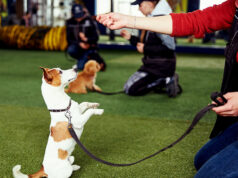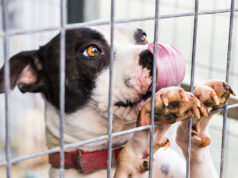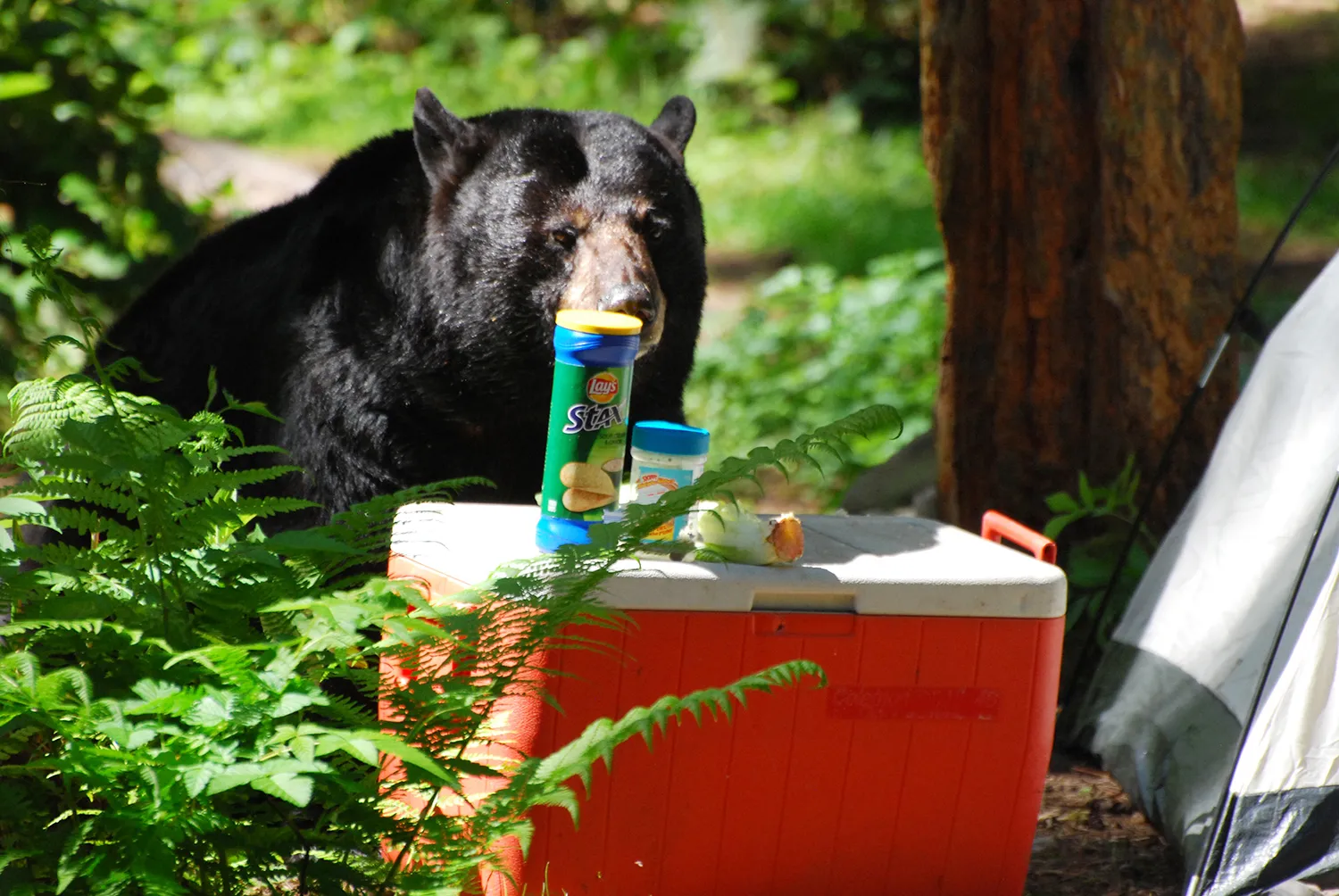
Bears are one of the most feared animals in the world and for good reason. They’re powerful, ferocious creatures that can cause serious damage if they get their hands on your food. We’re going to share some tips on how to keep them away from food when camping. From setting up bear-proof storage containers to keeping a close eye on your food, these tips will help you stay safe while out in the wilderness.
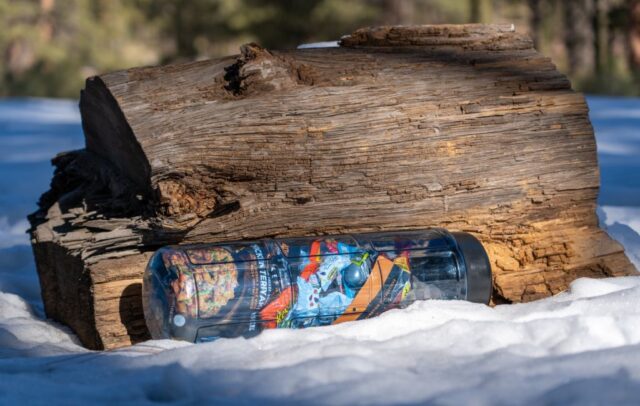
Use Bear-Resistant Containers
Food storage can be a major issue when camping with bears. The most effective way to protect food is by using bear-resistant containers. These containers are designed to prevent them from gaining access to food and can provide an added layer of safety for campers.
When selecting a container for food storage, consider the size, shape, and weight of the item. Most importantly, make sure the backpacking bear canister is tough enough to resist damage from an attack. Some popular containers include packaging from backpacking gear, gun cases, and toolboxes.
The three main types of containers are:
1) The hanger style: These containers have a cable system that hangs them from trees or poles. This makes them difficult for bears to climb into or pull down.
2) The slide style: These containers have a rail system that slides out of the way when not in use.
3) The box style: These containers have a lid that can be lifted up to access the food inside.
What Are The Benefits?
They reduce the likelihood of bear attacks, injuries, or fatalities.
Conventional storage containers can be easily breached by bears, leading to food spoilage and attractants that bring the animal in contact with people and/or other animals, while specialized containers are safe.
-Bear-resistant storage containers are difficult for bears to open, making them less likely to consume food that is harmful to humans or animals.
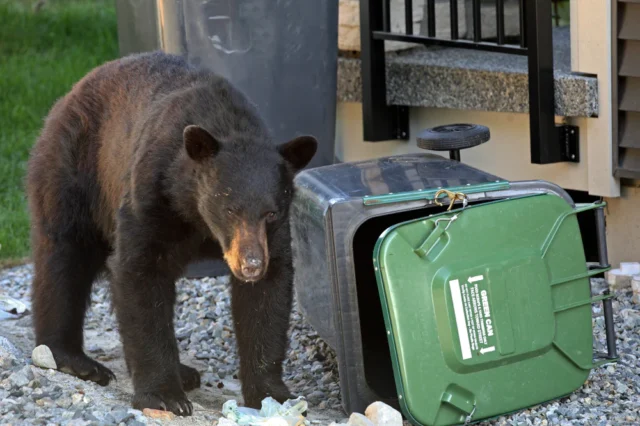
Make Noise To Repel The Animal
There are many ways to make noise to repel bears, but the most important thing is to be aware of your surroundings. Make sure you have a good set of survival gear if you’re hiking in their country, and making lots of noise. If a bear is detected, make yourself as big as possible and use anything you can find to protect yourself: rocks, your fists, a stick.
Don’t run! They are fast and agile and will likely chase after you if they see you running. Try to stay calm and avoid looking threatening; bears may become more aggressive if they feel threatened or cornered. If all else fails, try to fight back with whatever you have. Use your voice, throw objects at the animal, or pepper it with foam rubber shots from a pellet gun.
Be Aware Of Bear Behavior
They are one of the most iconic animals in North America. They can be found all over the continent, from the Arctic to the tropics. These animals are classified as omnivores, meaning that they are able to consume both plant and animal material. They exhibit a wide range of behaviors, including but not limited to: foraging for food, sleeping, nursing their young, playing, defending territories, and communicating.
Foraging for food is perhaps the most common behavior exhibited by this animal. They will search for food in any available location, whether it be in trees or on the ground. Some bears have been known to dig down into snowbanks in search of buried food sources. As omnivores, they need plenty of protein to survive. They will eat a variety of things such as insects, fungi, fruits, vegetables, and other small animals. They have even been known to scavenge carcasses from slaughterhouses.
They also spend a lot of time sleeping. This can vary depending on the environment and stress levels, but it usually involves spending some time reclining with its head hanging off of something soft (usually a tree). Some of them will also curl up together in groups during sleep. Nursing their young is another important behavior exhibited by these animals. Cubs will nurse from their mothers for around six months until they are able to fend for themselves. After nursing their young for a period of time, bears will start to forage for food again.
They can become aggressive when they are feeling threatened or when they are defending their territories. They may vocalize, paw at people, or swipe at them with their claws. If you encounter a bear while camping, the best thing to do is to stay calm and make yourself as small as possible. Back away slowly and avoid making any sudden movements. If you feel like you are in danger, try to make yourself as big as possible and scream or yell for help.
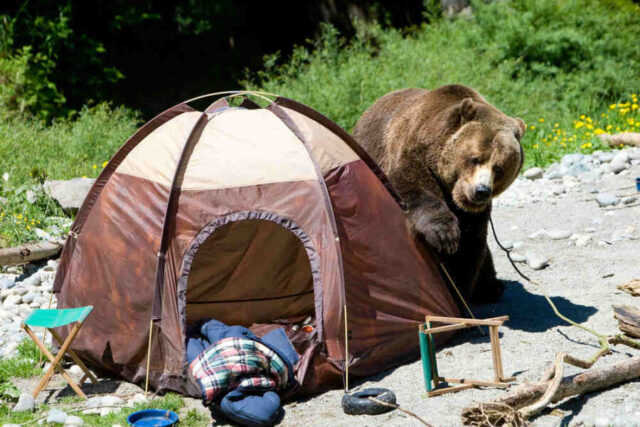
How To Avoid Bears When Camping?
Camping is a great way to get away from the hustle and bustle of everyday life, and it can be a truly enjoyable experience. However, one thing that can make camping difficult is the fact that bears are often attracted to campgrounds.
There are many ways to avoid being stalked by these animals, though some may be more effective than others. One way to avoid becoming a victim is to make sure your campsite is well-secured. Make sure all of your food, equipment, and supplies are stored in a safe location out of reach of bears, and keep a close watch on your campsite at all times. Additionally, always carry bear spray with you in case you need to defend yourself from an attack.
Other precautions you can take include ensuring that your noise levels are low when you’re sleeping or cooking; keeping a clean camp area; and avoiding human odor by showering before entering your tent or RV. Finally, never approach or feed bears, as this could encourage them to become aggressive toward you. With these tips in mind, camping can be an enjoyable experience free from dangers – but only if you take the necessary precautions!
Conclusion
Camping is a great way to break the monotony of everyday life, but it’s important to remember that bears are wild animals and can be dangerous. Make sure to keep your food storage safe by following these tips for keeping bears away from your food when camping: – Store your food in a bear-proof container – Keep your campsite clean and free of clutter – Make noise when you’re cooking or eating so that bears know you’re not afraid of them – Keep a close eye on your children when they’re playing outside.


